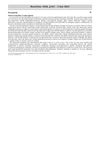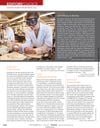
Continuous research and innovative strategies are essential for sustainable development.
 3 citations,
July 2022 in “Problemy èndokrinologii”
3 citations,
July 2022 in “Problemy èndokrinologii” Metformin, a diabetes drug, may also help fight cancer, but more research is needed to understand how.
11 citations,
March 2016 in “Cell cycle/Cell cycle (Georgetown, Tex. Online)” Old hair follicles grew better when moved to a young environment.
[object Object]  15 citations,
March 1998 in “Journal of Public Policy & Marketing”
15 citations,
March 1998 in “Journal of Public Policy & Marketing” The paper concludes that drug labels should be clear for all, especially for those with low literacy, and suggests aiming for high comprehension test passing rates with diverse test populations.
 153 citations,
November 2004 in “Current Medicinal Chemistry”
153 citations,
November 2004 in “Current Medicinal Chemistry” The document concludes that Catalyst software is effective for drug design, identifying potent compounds for various medical conditions.
 1 citations,
January 2017 in “Social Science Research Network”
1 citations,
January 2017 in “Social Science Research Network” The document suggests creating a secure database for indigenous knowledge and recommends that the TKDL actively fight patents that slightly alter traditional knowledge.
 18 citations,
June 1998 in “Circulation”
18 citations,
June 1998 in “Circulation” Mild essential fatty acid deficiency can cause health issues and is worsened by low-fat diets.
 June 2021 in “Reactions Weekly”
June 2021 in “Reactions Weekly” Finasteride caused serious side effects and led to six suicides.
85 citations,
October 2007 in “International Journal of Dermatology” Curly hair shape is due to uneven growth patterns in the hair follicle.
245 citations,
October 2015 in “Nature medicine” Hair follicle-derived IL-7 and IL-15 are crucial for maintaining skin-resident memory T cells and could be targeted for treating skin diseases and lymphoma.
50 citations,
May 2021 in “Frontiers in immunology” Certain immune cells contribute to skin autoimmune diseases, and some treatments can reverse hair loss in these conditions.
April 2016 in “Dermatology Times” Ginseng might help with energy, memory, aging, cancer, skin issues, and hair loss.
 September 2013 in “Science”
September 2013 in “Science” Special astrocytes improved learning and memory in rats after a stroke.
 22 citations,
January 2008 in “Physiological Research”
22 citations,
January 2008 in “Physiological Research” Steroid sulfatase is important for activating hormones that affect memory, brain function, and certain diseases, and could be a target for treating hormone-related disorders.
 September 2013 in “Science”
September 2013 in “Science” Transplanted human Olig2+ astroglia may help improve learning and memory after a stroke.
61 citations,
April 2018 in “Frontiers in endocrinology” Sex steroids produced in the hippocampus are crucial for brain functions like memory and learning in rodents.
 69 citations,
September 2006 in “Human Reproduction”
69 citations,
September 2006 in “Human Reproduction” Women with PCOS have fewer activated T cells in their ovarian follicles, which might affect fertility.
 1 citations,
August 2015 in “Journal of the Korean neurological association”
1 citations,
August 2015 in “Journal of the Korean neurological association” A man had a rare stroke possibly due to taking finasteride, which might have increased his hormone levels causing a blood clot. His memory loss didn't fully recover even after stopping the medication.
April 2017 in “The journal of investigative dermatology/Journal of investigative dermatology” Researchers developed a method to grow human hair follicles using 3D-printed skin models and modified cells.
 8 citations,
November 2020 in “Nature Communications”
8 citations,
November 2020 in “Nature Communications” Adult stem cells with Tp63 can form hair and skin cells when placed in new skin, showing they have hidden abilities for skin repair.
 31 citations,
March 2015 in “The Journal of Steroid Biochemistry and Molecular Biology”
31 citations,
March 2015 in “The Journal of Steroid Biochemistry and Molecular Biology” Neuroactive steroids could become safe, effective treatments with more understanding of their complex brain actions and metabolism.
 September 2013 in “Science”
September 2013 in “Science” Human stem cells can aid stroke recovery, research experiences boost students' career aspirations, minoxidil may reduce cancer spread, a molecule can slow tumor growth, a protein affects water flow in cells, magnesium behaves differently at tiny scales, and a new method detects slow-moving objects.
 June 2011 in “Oncology times”
June 2011 in “Oncology times” Dr. Mario Lacouture recommends preventive and specific treatments for skin side effects caused by EGFR inhibitors to improve patients' quality of life.
 June 2011 in “Oncology times”
June 2011 in “Oncology times” New treatments are making advanced prostate cancer management more complex but also more hopeful.
 1 citations,
January 2020 in “International journal of research in pharmacy and chemistry”
1 citations,
January 2020 in “International journal of research in pharmacy and chemistry” Eclipta alba has many health benefits and potential for medical and nutritional use.
6 citations,
August 2020 in “Journal of Plastic Reconstructive & Aesthetic Surgery” Home practice solutions using simple materials can help maintain microsurgical skills during lockdowns.
 March 2024 in “medRxiv (Cold Spring Harbor Laboratory)”
March 2024 in “medRxiv (Cold Spring Harbor Laboratory)” Recent selection on immune response genes was identified across seven ethnicities.
 September 2013 in “Science”
September 2013 in “Science” Undergraduate research experiences boost students' research skills, confidence, and career aspirations.
 9 citations,
February 2012 in “Social Semiotics”
9 citations,
February 2012 in “Social Semiotics” The document concludes that modern photo stories help represent and challenge how breast cancer affects women's identities and societal norms.
[object Object] September 2022 in “Translational Andrology and Urology” Finasteride may cause lasting sexual and mental health issues, and genetic screening could help prevent them.





















